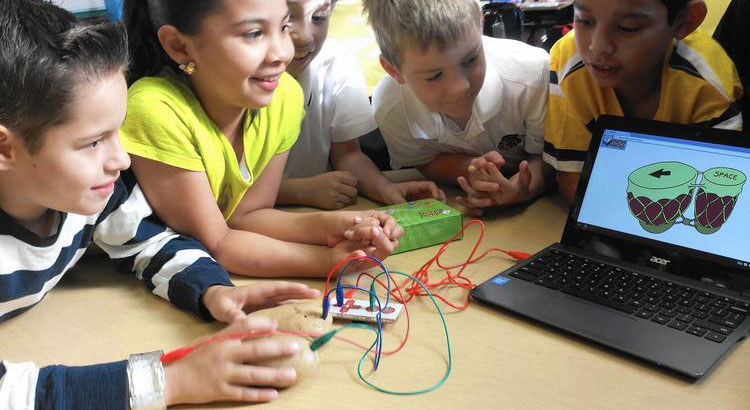We all know that our future depends on our children. And the kids’ education is so important to how they will navigate in uncertain times.
So it’s truly heartening when we learn about educators who focus on helping children prepare for their adult years even though none of us truly knows what that future holds.
Our LifeChanger of the Year program, which searches the nation for the very best educators, has so many examples of schools that are looking forward and helping their students do the same.
We wanted to share this story from Julie Ahern, who is a second grade teacher at Andrew Cooke Magnet Elementary School in Waukegan, Ill. She is all about the future.
 By Julie Ahern
By Julie Ahern
“With the accelerating pace of social and technological change, the World Economic Forum estimates that 65% of children today will end up in careers that don’t even exist.” Craig and Marc Kielburger
For 25 years I have taught at an elementary school in a diverse high poverty vibrant community. Five years ago a retiring colleague told me that we needed to teach to the children of today and not as we were taught. This comment started me on a journey of researching and developing a program to prepare my students for what they will need to thrive in a virtually unknown workforce. The basic skills will still be important to master, however, the Kielburger article (from the quote above) shares that the World Economic Forum asked various executives from some of the world’s leading companies what the ten most important job skills would be in 2020. It is intriguing to learn that their number one response was – complex problem solving. The Kielburger article puts it in perspective this way, “….consider this: just ten years ago, ‘social media manager’ or ‘mobile app developer’ would have seemed like imaginary job titles to most.”
Therefore, one can only imagine the kinds of jobs our children will face in 10 to 15 years with technology becoming ever intertwined in our everyday life and advancing at an accelerated pace. Taking this all into consideration teachers must provide students with the experiences that will build the skills needed. One way is by getting our students engaged with early coding experiences, such as the courses offered on the site, Hour of Code. My second graders have written hundreds of lines of code during Computer Science Week in December. What is exciting is that the students who might not necessarily excel in the traditional subjects absolutely shine in coding. I have seen this every year during our four years involved with Hour of Code.
Although it could be said that my students are young at 7 and 8 years old, I truly feel it is not too early to plant that visionary seed in each one of them. In the future they will not necessarily be ‘makers’ anymore but become the creators and designers of the technology that will produce and serve us. Therefore, we have different kinds of robots available in our classroom such as Dash and Ozobot, so that the students can learn how to program them. We also review and research the present capabilities of robotics and the future uses that are already envisioned. We are fortunate to have several 3D printers in our classroom. Last year the band teacher came to us and shared that a student had an aversion to the metal mouthpiece on his horn and asked if we could print one. My students went on the site Thingverse and found a file for a mouthpiece and printed it off. They were thrilled to later learn that it worked. However, one of my most memorable and defining moments occurred when another student came to our room for a break and upon seeing the 3D printer in action asked, “What is that?!” As the teacher, I started walking in his direction to explain it all, however, one of my quietest students took his arm and brought him over and started to share all about the process, described the parts on the printer, and finally the future potential of this technology. He listened with rapt attention and she shared with awe-inspiring confidence. If ever there was a defining moment for me, this was one of them. Her confidence and knowledge summed it all up: we need our students to be complex problem-solvers, communicators, and ready to tackle the new and unimaginable (but exciting!) career opportunities that will be there when they graduate. It begins today!
Link to a short video about tech activities in our classroom: https://www.youtube.com/watch?v=rQBJaHCdAS0
TC98999(0118)1

